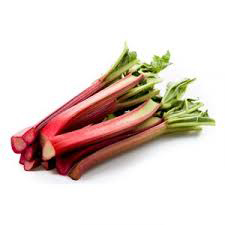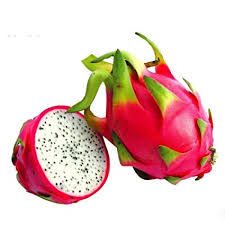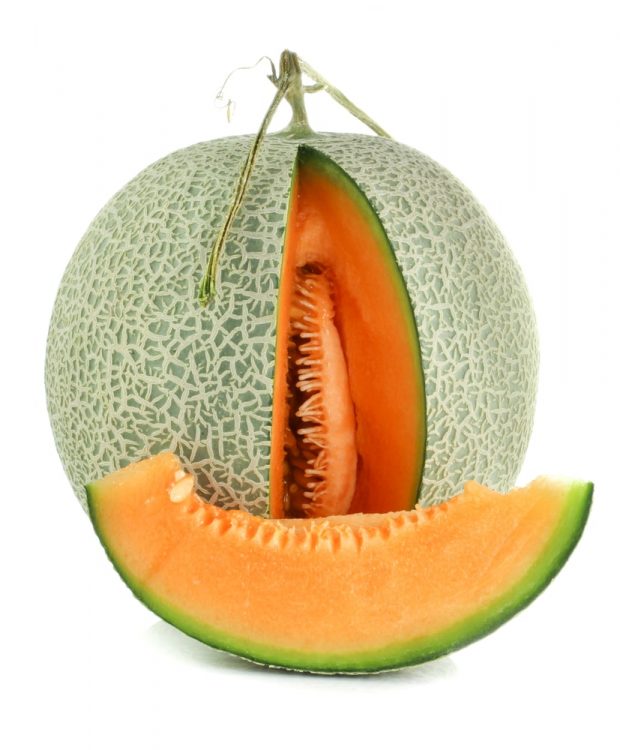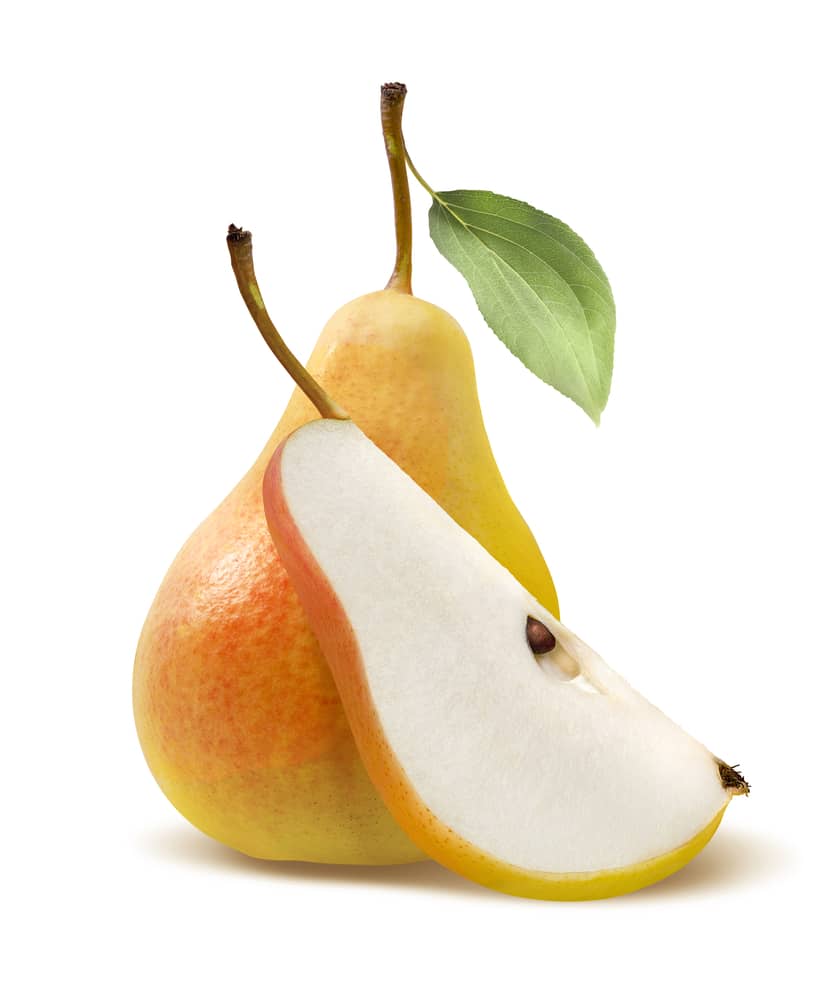
Recettes à la poire
9 février 2017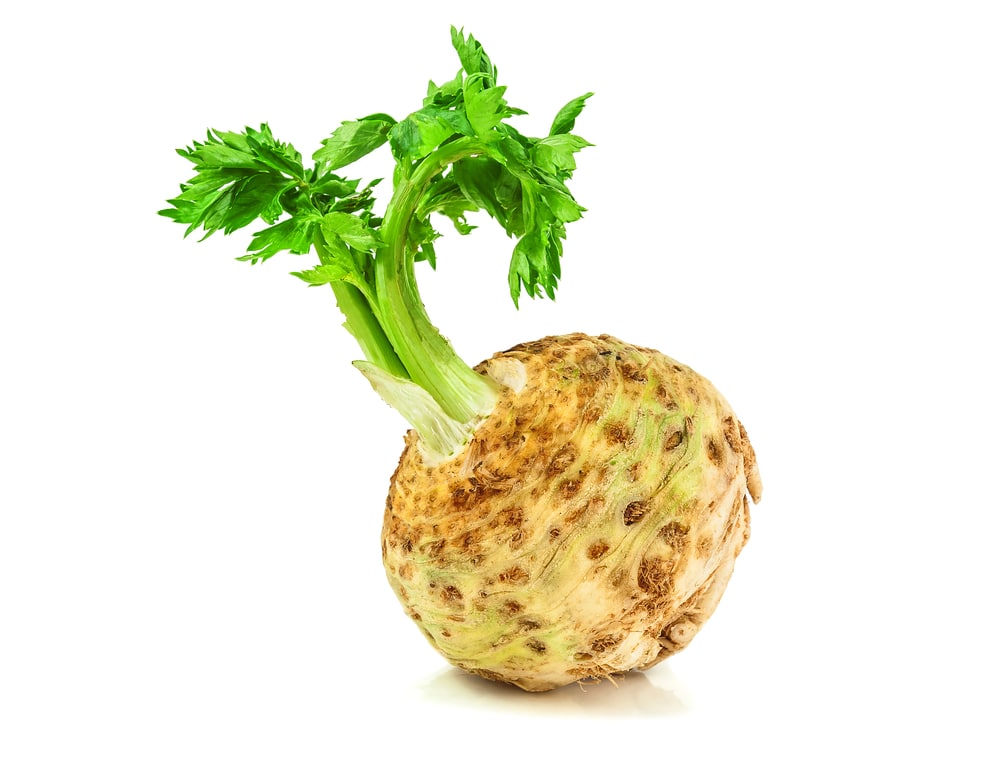
Le céleri rave dans la cuisine du jardin
9 février 2017Recette à la framboise
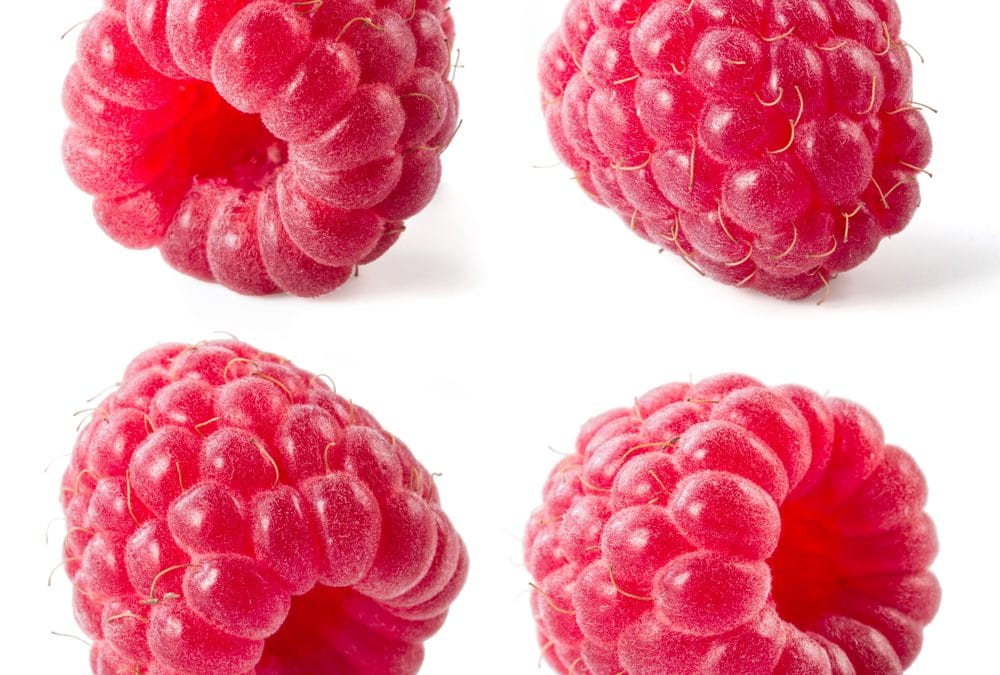
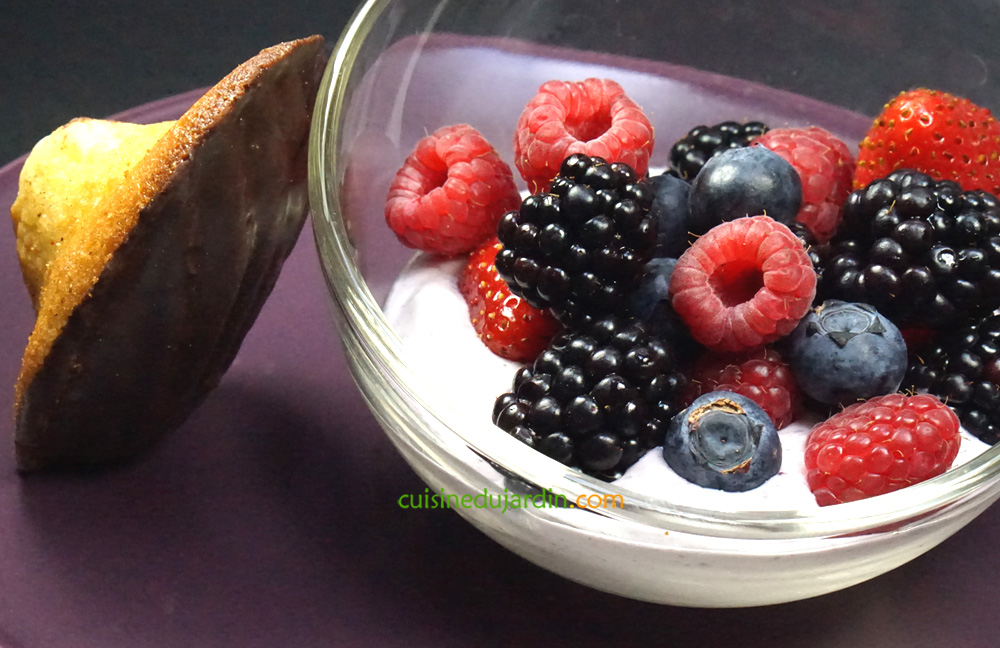
Chantilly mascarpone, fruits rouges et madeleine chocolat

Gaufre aux framboises sur sorbets citron

Framboises et mousse de fromage blanc, gingembre et citron vert
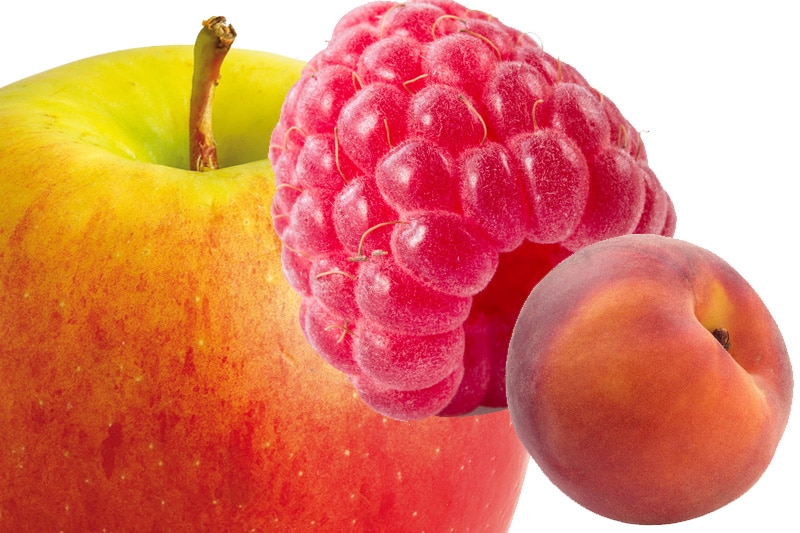
Smoothie pêche, pomme, framboise

-

Chantilly mascarpone, fruits rouges et madeleine chocolat
-

Gaufre aux framboises sur sorbets citron
-

Framboises et mousse de fromage blanc, gingembre et citron vert
-

Smoothie pêche, pomme, framboise
Avec quelques fruits (en saison de préférence), elle parfume énormément toute sorte de jus sucrés.Vous avez des framboises au jardin ? Le juicing est un excellent moyen d'utiliser votre excédent ou les fruits parfois irréguliers mais au goût inimitable (congeler l'excédent pour vos jus d'hiver). La fraîcheur de la framboise est éphémère, c'est la baie la plus fragile.
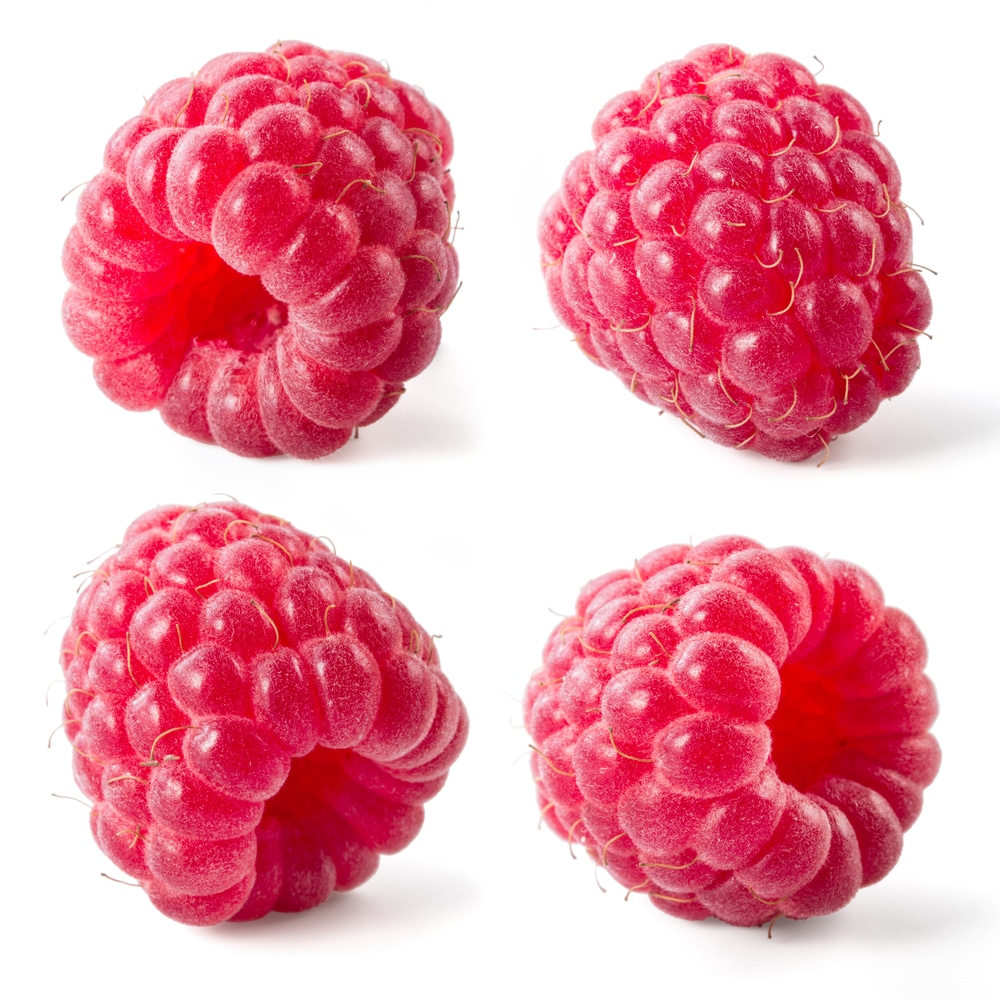
Ses bienfaits
La framboise apporte peu de calories mais une haute densité minérale (potassium, phosphore, magnésium, etc.) Riche en fibres et en vitamine C, la framboise est également source de manganèse et de vitamine B9.| A la loupe | Framboise fraîche |
|---|---|
| Sodium (mg/100g) | 3,45 |
| Magnésium (mg/100g) | 22,4 |
| Phosphore (mg/100g) | 24,4 |
| Potassium (mg/100g) | 201 |
| Calcium (mg/100g) | 20,6 |
| Manganèse (mg/100g) | 0,455 |
| Fer (mg/100g) | 0,715 |
| Cuivre (mg/100g) | 0,11 |
| Zinc (mg/100g) | 0,34 |
| Sélénium (µg/100g) | 0,744 |
| Iode (µg/100g) | 0,5 |
| Protéines (g/100g) | 1,4 |
| Protéines brutes, N x 6_25 (g/100g) | 1,4 |
| Glucides (g/100g) | 4,25 |
| Sucres (g/100g) | 4,25 |
| Energie, Règlement UE N° 1169/2011 (kJ/100g) | 188 |
| Energie, Règlement UE N° 1169/2011 (kcal/100g) | 45,1 |
| Amidon (g/100g) | 0 |
| Energie, N x facteur Jones, avec fibres (kJ/100g) | 188 |
| Energie, N x facteur Jones, avec fibres (kcal/100g) | 45,1 |
| Polyols totaux (g/100g) | 0 |
| Fibres (g/100g) | 6,7 |
| Eau (g/100g) | 84,7 |
| Lipides (g/100g) | 0,3 |
| Rétinol (µg/100g) | 0 |
| Beta-Carotène (µg/100g) | 45 |
| Vitamine D (µg/100g) | 0 |
| Vitamine E (mg/100g) | 0,48 |
| Vitamine K1 (µg/100g) | 7,8 |
| Vitamine K2 (µg/100g) | - |
| Vitamine C (mg/100g) | 25,1 |
| Vitamine B1 ou Thiamine (mg/100g) | 0,03 |
| Vitamine B2 ou Riboflavine (mg/100g) | 0,152 |
| Vitamine B3 ou PP ou Niacine (mg/100g) | 0,5 |
| Vitamine B5 ou Acide pantothénique (mg/100g) | 0,284 |
| Vitamine B6 (mg/100g) | 0,06 |
| Vitamine B12 (µg/100g) | 0 |
| Vitamine B9 ou Folates totaux (µg/100g) | 36,5 |
| Alcool (g/100g) | 0 |
| Acides organiques (g/100g) | 2,12 |
| Cholestérol (mg/100g) | < 0,04 |
Ces bénéfices sont habituellement reconnus mais dans certains cas l’avis d’un médecin spécialisé dans les médecines alternatives est indispensable.

Chantilly mascarpone, fruits rouges et madeleine chocolat

Gaufre aux framboises sur sorbets citron

Framboises et mousse de fromage blanc, gingembre et citron vert

Smoothie pêche, pomme, framboise

-

Chantilly mascarpone, fruits rouges et madeleine chocolat
-

Gaufre aux framboises sur sorbets citron
-

Framboises et mousse de fromage blanc, gingembre et citron vert
-

Smoothie pêche, pomme, framboise
center
no-repeat;center top;;
auto
Avec quelques fruits (en saison de préférence), elle parfume énormément toute sorte de jus sucrés.Vous avez des framboises au jardin ? Le juicing est un excellent moyen d’utiliser votre excédent ou les fruits parfois irréguliers mais au goût inimitable (congeler l’excédent pour vos jus d’hiver). La fraîcheur de la framboise est éphémère, c’est la baie la plus fragile.
no-repeat;center top;;
auto

Ses bienfaits
La framboise apporte peu de calories mais une haute densité minérale (potassium, phosphore, magnésium, etc.)
Riche en fibres et en vitamine C, la framboise est également source de manganèse et de vitamine B9.
no-repeat;center top;;
auto
| A la loupe | Framboise fraîche |
|---|---|
| Sodium (mg/100g) | 3,45 |
| Magnésium (mg/100g) | 22,4 |
| Phosphore (mg/100g) | 24,4 |
| Potassium (mg/100g) | 201 |
| Calcium (mg/100g) | 20,6 |
| Manganèse (mg/100g) | 0,455 |
| Fer (mg/100g) | 0,715 |
| Cuivre (mg/100g) | 0,11 |
| Zinc (mg/100g) | 0,34 |
| Sélénium (µg/100g) | 0,744 |
| Iode (µg/100g) | 0,5 |
| Protéines (g/100g) | 1,4 |
| Protéines brutes, N x 6_25 (g/100g) | 1,4 |
| Glucides (g/100g) | 4,25 |
| Sucres (g/100g) | 4,25 |
| Energie, Règlement UE N° 1169/2011 (kJ/100g) | 188 |
| Energie, Règlement UE N° 1169/2011 (kcal/100g) | 45,1 |
| Amidon (g/100g) | 0 |
| Energie, N x facteur Jones, avec fibres (kJ/100g) | 188 |
| Energie, N x facteur Jones, avec fibres (kcal/100g) | 45,1 |
| Polyols totaux (g/100g) | 0 |
| Fibres (g/100g) | 6,7 |
| Eau (g/100g) | 84,7 |
| Lipides (g/100g) | 0,3 |
| Rétinol (µg/100g) | 0 |
| Beta-Carotène (µg/100g) | 45 |
| Vitamine D (µg/100g) | 0 |
| Vitamine E (mg/100g) | 0,48 |
| Vitamine K1 (µg/100g) | 7,8 |
| Vitamine K2 (µg/100g) | - |
| Vitamine C (mg/100g) | 25,1 |
| Vitamine B1 ou Thiamine (mg/100g) | 0,03 |
| Vitamine B2 ou Riboflavine (mg/100g) | 0,152 |
| Vitamine B3 ou PP ou Niacine (mg/100g) | 0,5 |
| Vitamine B5 ou Acide pantothénique (mg/100g) | 0,284 |
| Vitamine B6 (mg/100g) | 0,06 |
| Vitamine B12 (µg/100g) | 0 |
| Vitamine B9 ou Folates totaux (µg/100g) | 36,5 |
| Alcool (g/100g) | 0 |
| Acides organiques (g/100g) | 2,12 |
| Cholestérol (mg/100g) | < 0,04 |
no-repeat;center top;;
auto
Ces bénéfices sont habituellement reconnus mais dans certains cas l’avis d’un médecin spécialisé dans les médecines alternatives est indispensable.
left
no-repeat;center top;;
auto
(adsbygoogle = window.adsbygoogle || []).push({});
no-repeat;center top;;
auto


